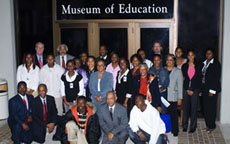

Pedagogical Activism and Social Justice |
||||||
This research project falls within the realm of the “long civil rights movement”—an effort to examine the struggle for civil rights and social justice during the decades before the 1954 Brown v. Board of Education Supreme Court decision. One of the more complex questions that arises in the field of education concerns teachers’ efforts to engage in political and cultural struggle. Black teachers during the 1940s who were members of the NAACP ran the risk of losing their jobs; public statements and actions could have been life-threatening. Even support of unions could cause a teacher to be dismissed, as was the case at Huntington High School. Years of hindsight offer little insight for today’s research to ascertain what acts and gestures should have been undertaken by teachers in 1940. Social activism within the classroom and outside of the school take on differing meaning and levels of “impact.” What does become apparent is that Drewry High School educators were well aware of social injustices, and seemingly many engaged in efforts to instill courage among students as a way to work for civil rights and social justice. The fact that Talladega College was an integrated community suggests that there are many more stories to be told, and it is my hope that numerous oral historians will conduct interviews with those students who attended Drewry Practice High School, now living throughout the United States, and bring more insight and attention to this remarkable school. |
||||||

an institutional member of the International Coalition of Sites of Conscience
curator@museumofeducation.info


